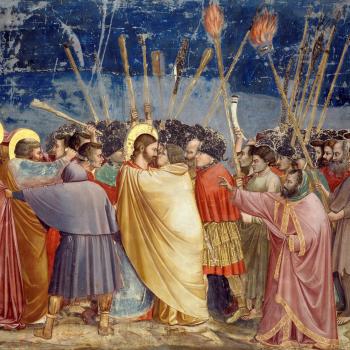Chesterton once observed that the testimony of history is that tyrannies are born in the ashes of tired democracies:
If there is one fact we really can prove, from the history that we really do know, it is that despotism can be a development, often a late development and very often indeed the end of societies that have been highly democratic. A despotism may almost be defined as a tired democracy. As fatigue falls on a community, the citizens are less inclined for that eternal vigilance which has truly been called the price of liberty; and they prefer to arm only one single sentinel to watch the city while they sleep.
Of course, when a culture is veering toward handing its liberties over to the Strong Man, you can always find a philosopher like Heidegger, Derrida, or this guy to dance attendance on the elite and offer reasons why only the elite should have a say in how to order the common good. But I’m with Chesterton to the end:
This is the first principle of democracy: that the essential things in men are the things they hold in common, not the things they hold separately. And the second principle is merely this: that the political instinct or desire is one of these things which they hold in common. Falling in love is more poetical than dropping into poetry. The democratic contention is that government (helping to rule the tribe) is a thing like falling in love, and not a thing like dropping into poetry. It is not something analogous to playing the church organ, painting on vellum, discovering the North Pole (that insidious habit), looping the loop, being Astronomer Royal, and so on. For these things we do not wish a man to do at all unless he does them well. It is, on the contrary, a thing analogous to writing one’s own love-letters or blowing one’s own nose. These things we want a man to do for himself, even if he does them badly. I am not here arguing the truth of any of these conceptions; I know that some moderns are asking to have their wives chosen by scientists, and they may soon be asking, for all I know, to have their noses blown by nurses. I merely say that mankind does recognize these universal human functions, and that democracy classes government among them. In short, the democratic faith is this: that the most terribly important things must be left to ordinary men themselves–the mating of the sexes, the rearing of the young, the laws of the state. This is democracy; and in this I have always believed.
Of course, the great risk, which Chesterton (and I) think worth taking is that “all have sinned and fallen short of the glory of God” and there is no guarantee that ordinary people will do the right thing. Democracy can produce an Abraham Lincoln or a Theodore or Franklin Roosevelt. It can produce a free people capable of meeting the challenge of global Depression, Hitler, Stalin, and Mao.
But it can also shout “Give us Barabbas!”
Still and all, God clearly prefers freedom and tells us that where the Spirit of the Lord is, there is freedom. But he also warn us not to submit to a yoke of slavery. The strange testimony of our race is that we often prefer that and call it “safety”.











